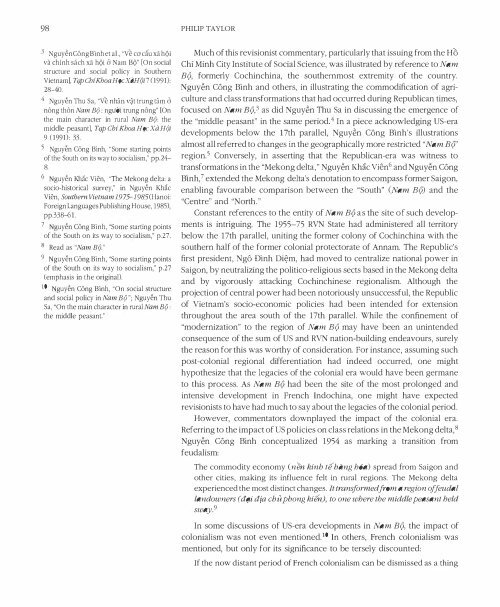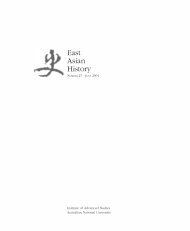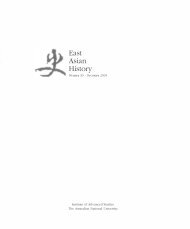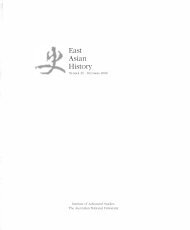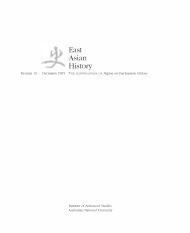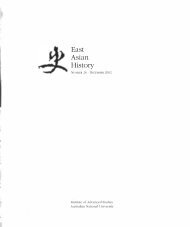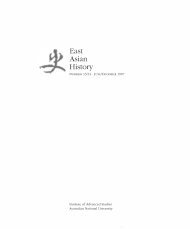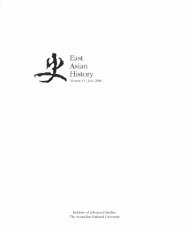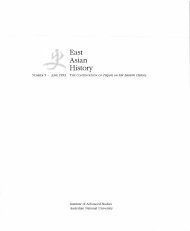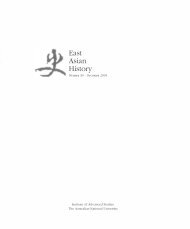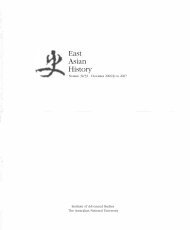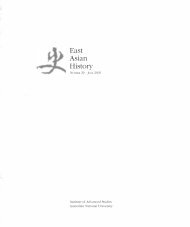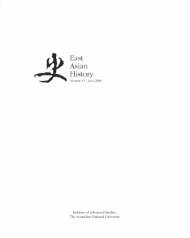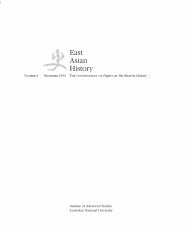(Philip Taylor) (PDF 3.1MB) - ANU
(Philip Taylor) (PDF 3.1MB) - ANU
(Philip Taylor) (PDF 3.1MB) - ANU
You also want an ePaper? Increase the reach of your titles
YUMPU automatically turns print PDFs into web optimized ePapers that Google loves.
98<br />
PHILIP TAYLOR<br />
3 Nguyen Cang Blnh et al., "V co du xa hQi<br />
va chinh sach xa hQi d Nam BQ" [On social<br />
structure and social policy in Southern<br />
Vietnam], Tffp ChiKhoaHQCXiiHt}i7 (991):<br />
28-40.<br />
4 Nguyen Thu Sa, "V nhftn vij.t trung tam d<br />
nang than Nam Bt} : nglloi trung nang" [On<br />
the main character in rural Nam Bt}: the<br />
middle peasant], Tffp Chi Khoa HQC Xii Ht}i<br />
9 (1991): 33<br />
5 Nguyen Cang Blnh, "Some starting points<br />
of the South on its way to socialism," pp.24-<br />
8.<br />
6 Nguyen KMc Vien, "The Mekong delta: a<br />
socio-historical survey," in Nguyen Khac<br />
Vien, Southern Vietnam 197 1985(Hanoi:<br />
Foreign Languages Publishing House, 1985),<br />
pp.338-61<br />
7 Nguyen Cang Blnh, "Some starting points<br />
of the South on its way to socialism," p.27.<br />
8 Read as "Nam Bt}."<br />
9 Nguyen Cang Blnh, "Some starting points<br />
of the South on its way to socialism," p.27<br />
(emphasis in the original).<br />
10 Nguyen Cang Blnh, "On social structure<br />
and social policy in Nam Bt} "; Nguyen Thu<br />
Sa, "On the main character in rural Nam Bt} :<br />
the middle peasant."<br />
Much of this revisionist commentary, particularly that issuing from the H6<br />
Chi Minh City Institute of Social Science, was illustrated by reference to Nam<br />
B{), formerly Cochinchina, the southernmost extremity of the country.<br />
Nguyn Cong Blnh and others, in illustrating the commodification of agriculture<br />
and class transformations that had occurred during Republican times,<br />
focused on Nam B{),3 as did Nguyn Thu Sa in discussing the emergence of<br />
the "middle peasant" in the same period 4 In a piece acknowledging US-era<br />
developments below the 17th parallel, Nguyn Cong Blnh's illustrations<br />
almost all referred to changes in the geographically more restricted "NamB{)"<br />
region. s Conversely, in asserting that the Republican-era was witness to<br />
transformations in the "Mekong delta," Nguyn Khitc Viin6 and Nguyn Cong<br />
Blnh, l extended the Mekong delta's denotation to encompass former Saigon,<br />
enabling favourable comparison between the "South" (Nam B{)) and the<br />
"Centre" and "North."<br />
Constant references to the entity of Nam B{) as the site of such developments<br />
is intriguing. The 1955-75 RVN State had administered all territory<br />
below the 17th parallel, uniting the former colony of Cochinchina with the<br />
southern half of the former colonial protectorate of Annam. The Republic's<br />
first president, Ngo Dlnh Dim, had moved to centralize national power in<br />
Saigon, by neutralizing the politico-religious sects based in the Mekong delta<br />
and by vigorously attacking Co chin chinese regionalism. Although the<br />
projection of central power had been notoriously unsuccessful, the Republic<br />
of Vietnam's socio-economic policies had been intended for extension<br />
throughout the area south of the 17th parallel. While the confinement of<br />
"modernization" to the region of Nam B{) may have been an unintended<br />
consequence of the sum of US and RVN nation-building endeavours, surely<br />
the reason for this was worthy of consideration. For instance, assuming such<br />
post-colonial regional differentiation had indeed occurred, one might<br />
hypothesize that the legacies of the colonial era would have been germane<br />
to this process. As Nam B{) had been the site of the most prolonged and<br />
intensive development in French Indochina, one might have expected<br />
revisionists to have had much to say about the legacies of the colonial period.<br />
However, commentators downplayed the impact of the colonial era.<br />
Referring to the impact of US policies on class relations in the Mekong delta,8<br />
Nguyn Cong Blnh conceptualized 1954 as marking a transition from<br />
feudalism:<br />
The commodity economy (nht kinh te'hang h6a) spread from Saigon and<br />
other cities, making its influence felt in rural regions. The Mekong delta<br />
experienced the most distinct changes. It transformed from a region of feudal<br />
landowners (dtJ,i dta chuphong kien), to one where the middle peasant held<br />
sway.9<br />
In some discussions of US-era developments in Nam B{), the impact of<br />
colonialism was not even mentioned. l O In others, French colonialism was<br />
mentioned, but only for its significance to be tersely discounted:<br />
If the now distant period of French colonialism can be dismissed as a thing


